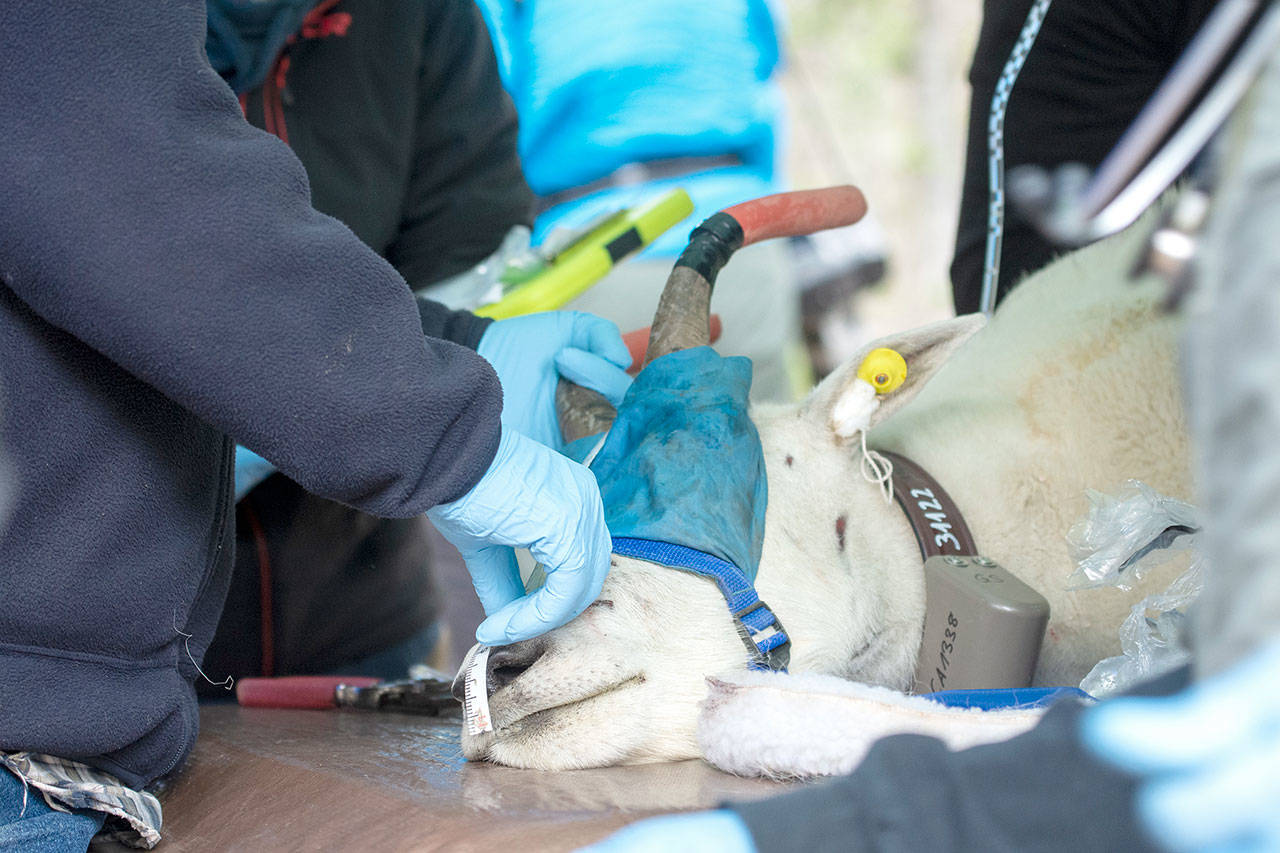OLYMPIC NATIONAL PARK — The first round of mountain goat relocation efforts this year is over. Officials were able to move 76 mountain goats from Olympic National Park and Olympic National Forest to the North Cascades.
A total of 89 goats were removed from the population, 13 of which either died during capture or transport, were euthanized because they were unfit for translocation, or were shot and killed; four were shot because they could not be captured safely.
The goat removal operations July 8 through July 19 were the first round of the translocation effort this year. More operations are planned Aug. 18 through Aug. 30.
“I am extremely grateful to the capture crew, park staff, and all of the partners and volunteers who worked so hard during the coldest and wettest two weeks of July imaginable,” said Patti Happe, wildlife branch chief at Olympic National Park.
This effort is a partnership between the National Park Service, the state Department of Fish & Wildlife and the USDA Forest Service to re-establish and assist in connecting depleted populations of mountain goats in the Washington Cascades while also removing non-native goats from the Olympic Mountains.
Though some mountain goat populations in the North Cascades have recovered since the 1990s, the species is still absent or rare in many areas of its historic range. Mountain goats were introduced to the Olympics in the 1920s to serve as game for hunters.
Last year, officials removed 115 goats from the population, which was estimated at about 700 goats at that time.
Of those, 98 were translocated, six were taken to Northwest Trek Wildlife Park and 11 either died during capture, transport or were euthanized.
So far a total of 174 goats have been translocated and 24 goats have died.
Leading Edge Aviation, a private company that specializes in the capture of wild animals, conducted aerial capture operations through a contract.
The helicopter crew used immobilizing darts and net guns to capture mountain goats and transport them in specially-made slings to staging areas located at Hurricane Ridge in Olympic National Park and the Hamma Hamma area in Olympic National Forest.
The animals were examined and treated by veterinarians before volunteers working with Fish & Wildlife transported them to pre-selected staging areas in the North Cascades.
The mountain goats were transported in refrigerated trucks to keep them cool.
Once at the staging areas, Fish & Wildlife and participating tribal biologists worked with HiLine Aviation to airlift the crated goats to release areas.
Release areas were chosen based on the quality of the mountain goat habitat, proximity to the staging areas and limited disturbance to recreationists.
Due to weather, the helicopter crew was able to operate for only 10 out of 12 days, with several days cut short because of the weather.
Weather also prevented airlifting goats to preferred release sites in the North Cascades on four of those days.
Fish & Wildlife used remote sites that were accessible to the refrigerated trucks instead.
Overall, the goats transported last year appear to be adapting as well as could be expected to their new homes in the North Cascades, officials have said.
About 70 percent of the relocated mountain goats survived through the winter, a number that is lower than typical, but about what was expected after relocation, officials said.
Kid and mother pairs that were moved are generally no longer together. Most of five kids that were still alive — out of 10 kids that were tracked — had found other goats to follow.
The mountain goats are not native to the Olympic Mountains, which do not naturally have the salts that the goats crave.
Originally 12 goats were introduced to the region and their population eventually grew to more than 1,000.
Officials have said the goats damage the fragile alpine and sub-alpine ecosystem and that they are dangerous to humans.
Bob Boardman, a Port Angeles man, was killed by a goat that gored him as he hiked Klahhane Ridge in October 2010.
In August, Mount Ellinor in Olympic National Forest will be an area of focus for capture efforts. All of the Mount Ellinor trails system and Forest Road 2419 to Mount Ellinor, as well as Forest Road 2464 leading to Forest Road 2419, will be closed to the public starting the evening of Aug. 18 until the morning of Aug. 30.
________
Reporter Jesse Major can be reached at 360-452-2345, ext. 56250, or at jmajor@peninsula dailynews.com.

